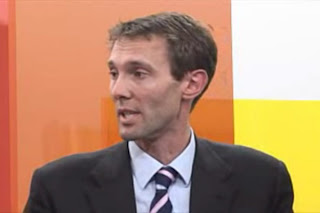The Energy Bill compromise is about revenues to the Treasury to help pay off the budget deficit before the next election.
The position on renewables in Britain stands in stark contrast to that north of the border.
The Scottish Government is hoping for independence after 2014. 90% of Britain's oil and gas is in Scottish territory. The Institute of Fiscal Studies is arguing that revenues after the possible independence would be split between the two nations proportionately on the basis of population.
But oil and gas production dropped 18% last year. It will continue this inexorable decline in years to come.
The Scots know this. That's why they are aiming for 100% renewable electricity by the end of this decade. They reckon they will even have more to spare. Perhaps to sell to England and Wales. At this rate, England and Wales are going to need it.
Perversely, George Osborne, David Cameron and the rest of the Conservatives are determined to hitch the UK's wagon to Qatar, from which most of our gas flows: there was a moment two weeks ago when almost 100% of Britain's gas fired power stations were running on gas imported from that Arab country.
But why would they do that?
Many authorities have commented on the volatility of gas prices. They are only likely to rise, affecting each and every one of us and the economy as a whole.
The Committee on Climate Change, in its report, Household energy bills – impacts of meeting carbon budgets, said "Of the total £455 increase [in typical household energy bills between 2004 and 2010] (i.e. 75%, compared to general price inflation of 16% over the same period), by far the largest contributor was the increase in the wholesale price of gas, which added around £290 to bills.”
And Ofgem agrees. In Why are energy prices rising?, we read: “Higher gas prices have been the main driver of increasing energy bills over the last eight years”.
But, forget this. Forget, even, Qatar. This decision is directly related to what the Exchequer receives from North Sea gas extraction.
A dash for gas means a market for Scottish-English gas as well. High gas prices mean higher revenues for the Treasury.
I have prepared this chart of Government revenues from UK oil and gas production, available from figures published here.

Most of this revenue comes from the Ring Fence Corporation Tax, rated at 30% and separate from other corporation tax, which was introduced under New Labour. This prevents taxable profits from oil and gas extraction in the UK and UKCS being reduced by losses from other activities or by excessive interest payments.
It explains why George Osborne gave away £500 million towards further gas and oil offshore exploration in September. As he said at the time, it's because he will get it back in spades from revenue to come: “It will give companies the incentive to get the most out of older fields, creating jobs and delivering more revenue for taxpayers.“
The revealing thing is what happens if you plot oil and gas revenues against total tax revenues.
Then we find, that in the crunch tax year, 2008-2009, oil and gas revenues were at their highest as a proportion of all tax revenue: 2.56%.
As the recession hit, it fell again. The following two years it was at 1.37% and 1.67%, but it has begun to rise again to 2.04% in the current financial year. There have only been three years in the last 20 when it is gone above 2%.
Here are the full figures:
| Year | % of revenue from oil and gas | Total revenue (£bn) |
|---|---|---|
| 00/01 | 1.24 | 359.3 |
| 01/02 | 1.47 | 369.1 |
| 02/03 | 1.37 | 375 |
| 03/04 | 1.08 | 397 |
| 04/05 | 1.21 | 427.1 |
| 05/06 | 2.05 | 456.8 |
| 06/07 | 1.84 | 486 |
| 07/08 | 1.45 | 516 |
| 08/09 | 2.56 | 508 |
| 09/10 | 1.37 | 477.8 |
| 10/11 | 1.67 | 528.9 |
| 11/12 | 2.04 | 550.6 |
| 12/13 | 1.7 | 569 |
| 13/14 | 1.34 | 599 |
| 14/15 | 1.19 | 633 |
| 15/16 | 0.92 | 664 |
| 16/17 | 0.85 | 704 |
Treasury predictions for the next four years show this percentage to fall dramatically, but this is only because there are wildly optimistic expectations for tax revenue to increase in this period, to £70.4 billion in 2016/17, compared to £55 billion in this financial year.
Now consider this: renewable energy does not provide such an income. In fact it’s a cost, because of the subsidies.
Conclusion: the Energy Bill compromise is not about what happens after 2020. That couldn’t be further from Osborne’s mind. It's about revenues to the Treasury to help pay off the budget deficit before then.
To put it bluntly, it's about who wins the next election, since it will most likely be determined by how well Osborne has managed the economy.

